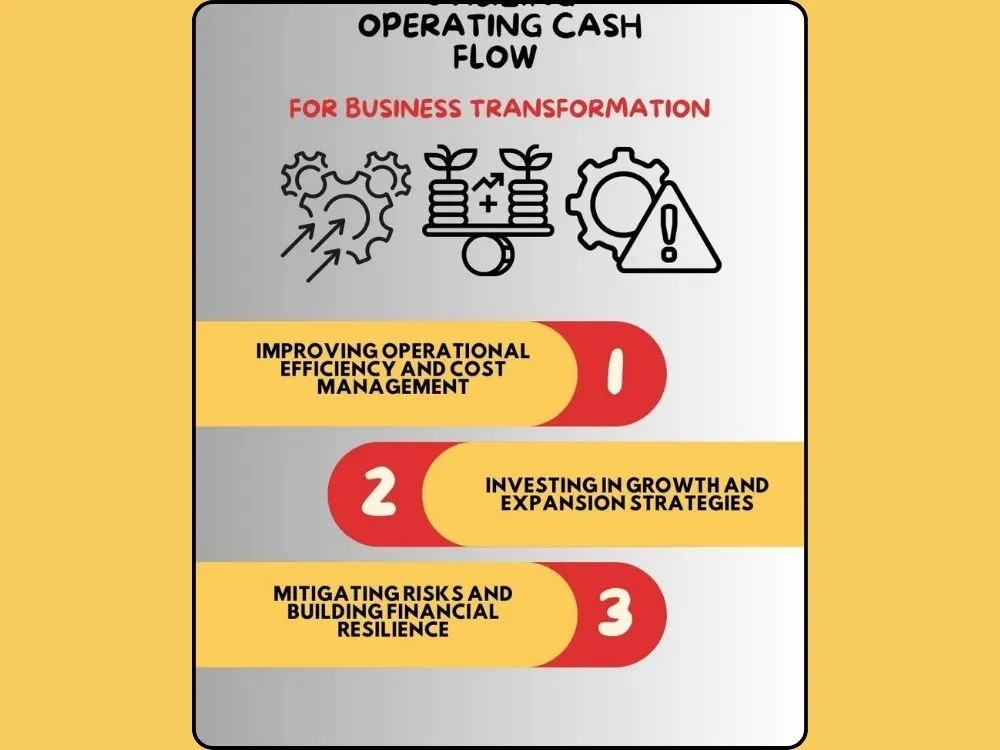
From Surviving to Thriving: How Operating Cash Flow Can Revolutionize Your Business
Operating cash flow (OCF) is an important financial metric and a vital financial indicator. It provides clear insights to companies to identify the business’s ability to generate cash flow from its primary operations. This excludes investments and other financing activities.
A positive OCF is a great indicator that showcases a company’s capability to generate sufficient cash flow from its operations. On the other hand, negative OCF means the company's cash inflows are lower than its outflows.
Key Takeaways
- Understand what operating cash flow (OCF) is. The cash a business generates from its main operations, excluding investments and financing activities.
- Learn why positive OCF is crucial for business growth and sustainability, helping to meet financial obligations, support growth, and reduce reliance on external financing.
- Know the key components of OCF: revenue, operating expenses, and working capital, and see how it differs from other metrics like net income.
- Recognize how OCF helps assess business performance and profitability, using indicators like profit margins and return on investment.
- Discover how businesses use OCF to improve efficiency, invest in growth, manage risks, and enhance cash flow management with technology.
Importance of Operating Cash Flow (OCF) in Business Sustainability and Growth
It's important to generate sufficient OCF where a business’s sustainability and growth are significantly dependent on this financial index. When companies have a positive OCF, it ensures business sustainability and growth, while a negative cash flow affects the organization significantly.

Here are some valid reasons for having a good OCF in an organization:
- Meeting Financial Obligations: Adequate OCF ensures meeting financial obligations such as paying employee salaries, suppliers, and other operational expenditures. It protects the company from financial crises and helps maintain its day-to-day business functions.
- Investment in Growth: OCF helps businesses serve as an internal funding source where the surplus funds can be reinvested to grow the business and its longevity.
- Reducing Dependency on External Financing: An excellent OCF aids in covering business expenditures and establishes sustainable business growth. So, business owners don't need to rely on external financial sources such as business loans or equity investments. This helps reduce the stressful debt burden of the company.
- Resilience During Downturns: In times of economic uncertainties and recessions, OCF supports by providing necessary resources to sustain in challenging times. It's a huge plus point for the business to sustain itself in challenging economic conditions.
- Credibility and Investor Confidence: A positive OCF increases the credibility of the business, where investors confidently invest. It shows external parties how reliable the business is in terms of generating constant cash flows without losses.
- Long-Term Planning: A reliable cash flow enables management to make strategic decisions based on long-term objectives and goals rather than short-term planning.
Understanding Operating Cash Flow (OCF)

Key Components of Operating Cash Flow (Revenue, Operating Expenses, Working Capital)
OCF consists of essential components such as revenue, operating expenses, and working capital. These components greatly influence a business's cash flow generation through its primary operations. Let’s look at each component in detail:
- Revenue: This is the total income that a business generates through its sale of goods in a specific period. It serves as the primary source of cash inflow and is a fundamental driver of Operating Cash Flow (OCF). Depending on the scale of operations, a business’s revenue can fall into different ranges. For example, a 5-figure amount, a 6-figure amount, or even higher.
- Operating Expenses: These are the expenses of a business to run its day-to-day business functions. It includes operating expenses such as employee wages, rent, utility bills, and many others. This is a prominent component in calculating the OCF of a business.
- Working Capital: It's the difference between a business’s current assets (cash, accounts receivable, inventories) and current liabilities (short-term debts, accounts payable). Working capital is a vital component in OCF, which directly impacts the calculation.
The OCF formula is as follows:
- Operating Cash Flow = Revenue – Operating Expenses +/- Working Capital
OCF is a salient financial indicator where a positive cash flow indicates that the business generates enough money from its operations that cover its spending. Conversely, negative cash flow indicates the business hasn’t generated sufficient money to cover its operating expenses. Therefore, every business should consider maintaining a positive OCF.
Differentiating OCF From Other Financial Metrics (e.g., Net Income, Cash Flow from Investing/Financing Activities)
The main difference between OCF and net income or cash flow of investments and financing activities is as follows.
- Operating Cash Flow Vs Net Income: OCF only includes cash flow that is generated from the company’s core business operations. It's the business’s regular revenue-generating activities, excluding non-cash spending such as depreciation, amortization, and so on. Net income is a metric that includes operating and non-operating expenses in the calculation, where non-operating expenses like sales tax, interest, and depreciation are included in the net income calculation.
- Operating Cash Flow Vs Cash Flow from Investing/Financing Activities: OCF is directly related to a company’s cash generation or consumption from its business operations, such as sales, payments to vendors, and other operating expenses. Cash flow from investing or financing activities includes long-term asset acquisition and sales. It indicates a company’s long-term planning and investment that incur cash flows that are not directly related to the business operations.
The Significance of Operating Cash Flow

Maintaining Financial Stability and Liquidity
OCF ensures the business functionality by providing adequate finance to run the short-term business functions. While operating the business, it has to cover different expenditures such as rents, wages, inventory costs, utility payments, and many others.
These costs can only be covered by having a substantial cash flow through its primary business operation. Therefore, in maintaining financial stability and liquidity, the OCF plays a significant role in every business.
It also helps organizations to reinvest the surplus money for necessary operations without opting for any external financing options like loans. Because of these important reasons, OCF is considered a vital element in maintaining a company’s financial stability and liquidity.
Evaluating Business Performance and Profitability
This evaluation is significant to understand the financial health status of the company. OCF is one of the crucial financial indicators that reveal the financial health of a business. Plus, several other important indicators show the business performance and profitability as below:
- Gross Profit Margin: It's the percentage of gross profit related to the revenue of the business from its sales of goods. This is a great indicator that shows how well an organization has generated cash flow of gross profit from its primary business function (sales). It's calculated as gross profit/revenue × 100 %.
- Net profit Margin: It represents the percentage of revenue left as net income after deducting all expenses, including non-operating expenses. The gross profit margin doesn’t take non-operating expenses into account.
- Return on Investment (ROI): ROI is the rate of return for the investment made by the company over a specific period. It's a great financial indicator of a business to measure its performance and profitability.
- Return on Equity: It's the return earned for the shareholders' equity investment. It indicates how much profit is generated from shareholders' equity investments.
Several other financial metrics are used along with OCF to measure the business performance and profitability, such as earnings per share (EPS), asset turnover ratio, debt-to-equity ratio, and many more. Analyzing these financial indicators helps measure business performance and identify pitfalls and areas of improvement needed.
Enhancing Investment Opportunities and Attracting Stakeholders
OCF reveals information to the investors and stakeholders of the business. A positive cash flow can attract more investment opportunities from potential investors and stakeholders.
Therefore, companies should focus on producing good positive cash flow to showcase their financial stability to investors and stakeholders. This helps acquire substantial investments to grow the business to the required level.
Utilizing OCF for Business Transformation

Improving Operational Efficiency and Cost Management
A positive OCF ensures a surplus of cash that can be utilized for great initiatives and developments. It helps improve the operational efficiency of a business by enhancing productivity.
Moreover, the surplus of cash flow is used to implement cost-effective strategies that help manage the costs in the organization. For example, reducing unnecessary expenditures, optimum resource allocation, and many other cost-cutting methods. Also, the surplus cash flow is useful for reinvestments and business growth.
Investing in Growth and Expansion Strategies
OCF is efficiently utilized for making investments for growth and expansion strategies. Here are some essential growth and expansion strategies that businesses focus on investing:
- Market Research: It's a paramount factor for every business that helps sufficiently grow and compete in the market. Conducting thorough market research needs financial resources, and it can be acquired through the company’s cash flow surplus.
- Product Development: Businesses should consider developing their products based on the current trends and market conditions. This is because customer expectations change from time to time. For this purpose, organizations use cash flow surpluses effectively in product research and development activities. This will help increase the product quality.
- Acquisition and mergers: Positive operating cash flow is utilized for acquiring essential technologies, assets, and other funding that organizations need to establish their market presence and enhancements.
- Marketing and Sales: This is a crucial thing for business development, where insufficient cash flow may reduce the chances of establishing the organization in the competitive market. Thus, a positive OCF is essential for necessary marketing and sales promotions that every business needs for growth and development.
- Geographic Expansions: Expanding the business in new territories and acquiring customers from different geolocations will increase sales, revenue, and profit. This is one of the primary goals of businesses and is achievable with enough financial resources. OCF surpluses are used to expand the market in different geographical locations and help overall business growth, and lead to great success.
Mitigating Risks and Building Financial Resilience
Risk mitigation and financial resilience are important aspects for long-term sustainability and growth. Companies have to identify potential financial risks that can diminish the growth potential and implement strategies to successfully eliminate them.
To perform this necessary task, companies should allocate adequate financial resources that can be acquired through operating cash flow. Proper risk management safeguards the business from huge losses, and it requires time, investigation, strategy implementation, and other financial requirements.
Also, a contingency plan ensures the establishment of protocols for handling unexpected challenges to the business. It includes investment costs such as insurance, arrangements of depreciation costs, and many other financial requirements that are associated with the business risk potential.
For example, if a business gets involved in a fire incident, it can easily recover if it has insurance coverage or any other necessary arrangements that cover renovations or business regains. This way, every business should have a contingency plan that helps protect it from huge business losses. OCF is an essential thing that is utilized for making this contingency plan work out.
Business Success Using Operating Cash Flow

Example 1: Small Business Leveraging Operating Cash Flow to Fuel Expansion
Small business success is highly dependent upon leveraging OCF to fuel its market expansion in several ways. As a business, it needs adequate finance for its necessary functions such as administration, technology integration, marketing, and promotion.
OCF helps acquire the funds for executing these functions, which support organizations for massive growth. It also safeguards small businesses from acquiring external funding sources. The cash surplus is used to reinvest in starting new stores and expanding the market.
Further, it's a vital fuel for business growth and market expansion, where customer acquisition and retention are key for small business success.
Example 2: Large Corporations Restructuring Using OCF
Large corporations are able to restructure their vital business functions with the help of utilizing OCF in their business operations without any reliance on external finances.
Large enterprises leverage a competitive advantage through OCF, where restructuring the business that adapt to the latest technology, innovation, and market demand is crucial for the business's sustainability.
It is not merely a cost but a viable investment that every business pays attention to restructure their business to survive and eradicate the competition successfully.
Implementing Effective Cash Flow Management Practices

Monitoring and Analyzing Operating Cash Flow Regularly
It's vital to monitor and analyze OCF regularly to ensure effective cash flow management in the organization. It involves careful monitoring and analysis of the cash inflow and outflow of a business from its primary business operation.
Further, the data that is derived from the OCF analysis is helpful to discover potential issues and to make informed business decisions. With the help of continuous monitoring and analysis, companies get clear insights regarding any anomalies that are present in cash flow, which helps implement proper strategies to regulate the cash flow in a favorable way for the business.
Utilizing Forecasting and Budgeting Techniques
These techniques are indispensable tools for effective cash flow management. Implementing them helps businesses better anticipate financial needs and identify potential challenges. Here are some valid reasons for this:
- Cash Flow Forecasting: A business should forecast its future cash inflows and outflows based on historical data and patterns (which may sometimes mismatch expectations). This is important to make strategic decisions to consolidate their financial stability.
- Budgeting: Comprehensive budgeting helps organizations allocate financial resources effectively, and it identifies important expenditures aligned with the revenue projections and long-term goals of the business. Moreover, businesses can cut down overspending expenses by adhering to the budget. So, it is a good technique for effective cash flow management.
The Role of Technology in Enhancing Cash Flow Management

Introduction to Cash Flow Management Tools and Software
Technology plays a pivotal role in enhancing cash flow management. There are various tools and software that are helpful for doing this. These tools and software simplify financial processes and aid in getting useful financial data insights in real time.
Here are some important reasons for utilizing these tools and software for enhancing cash flow management:
- Automated Cash Flow Tracking: Modern cash flow management tools and software help automate the cash flow tracking process, such as identifying cash inflows and outflows within a minute. In most cases, these software and tools are integrated with financial systems and a business's bank or merchant accounts, which provide real-time insights into cash flow.
- Cash Flow Forecasting: These advanced AI tools and software are very useful for forecasting a business's future cash inflows and outflows with an immediate scanning of historical data. This simplifies the process and provides accurate cash flow forecasting results.
- Budgeting and Expense Management: Utilizing these software tools facilitates budget preparation and expense tracking. It's useful to plan financial expenses and budgets to stabilize a business’s cash flow management.
- Invoice and Receivables Management: These advanced technology tools and software let businesses organize invoice handling and manage accounts receivable promptly. Plus, automation minimizes the invoicing time and payment delays.
In addition to these facilities, these tools and software are efficient in automating vendor payments, planning cash reserves, making scenario analyses, and many more cash flow management facilities for the business.
Benefits of Automation and Real-Time Reporting
Automation can significantly reduce manual errors in cash flow management. It minimizes the amount of time that is being spent on tasks. Also, it enhances efficiency by streamlining repetitive tasks and improves employees' focus on the business’s core functions.
Further, automation improves accuracy where there are fewer possibilities for errors in calculating and managing cash flow. Real-time reporting ensures timely decision-making by providing real-time cash flow insights. It's super helpful to monitor and analyze the financial performance of a business.
Because of these reasons, automation and real-time reporting are considered crucial for efficient cash flow management.
Final Thoughts
In the journey from surviving to thriving, operating cash flow (OCF) emerges as a strong tool that revolutionizes any business. By comprehending and leveraging this crucial financial metric, businesses can attain sustainability and growth.
A positive OCF helps in meeting financial commitments, lessens dependency on external financing, and offers resilience during economic downturns. Further, it increases credibility with investors and allows long-term planning.
FAQs
Q1: Why is operating cash flow important for a business?
Operating cash flow is essential for business sustainability and growth, which ensures financial obligations are met and reduces reliance on external financing.
Q2: How to calculate operating cash flow?
Operating Cash Flow = Revenue - Operating Expenses +/- Working Capital.
Q3: How does OCF help evaluate business performance?
It's one of the significant financial metrics that analyze profitability and efficiency, like other indicators such as gross profit margin, net profit margin, ROI, and ROE.
Q4: What are effective cash flow management practices?
Regular monitoring, forecasting, budgeting, and utilizing technology tools for automation and real-time reporting.
Explore Related Articles
https://smarttoolsai.com/post/risk-management-plan-for-your-high-risk-business
https://smarttoolsai.com/post/multi-step-income-statement-a-practical-guide-for-financial-clarity
.webp)